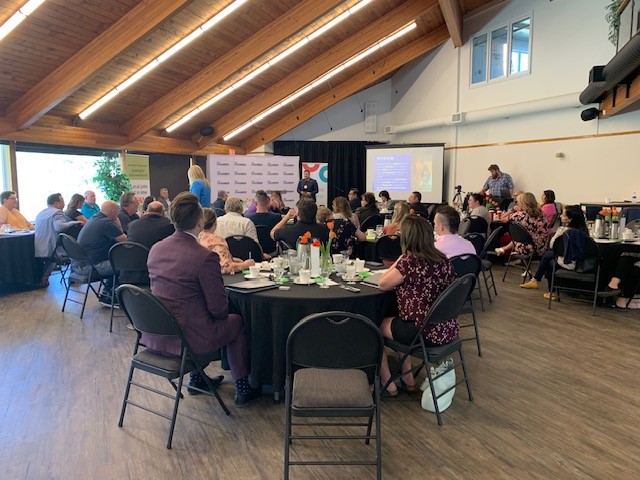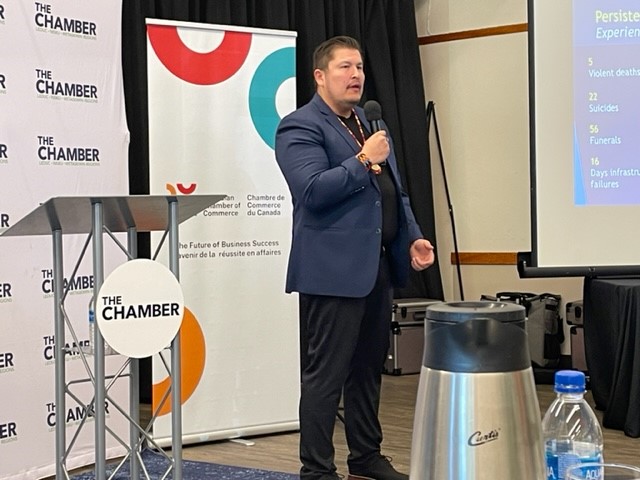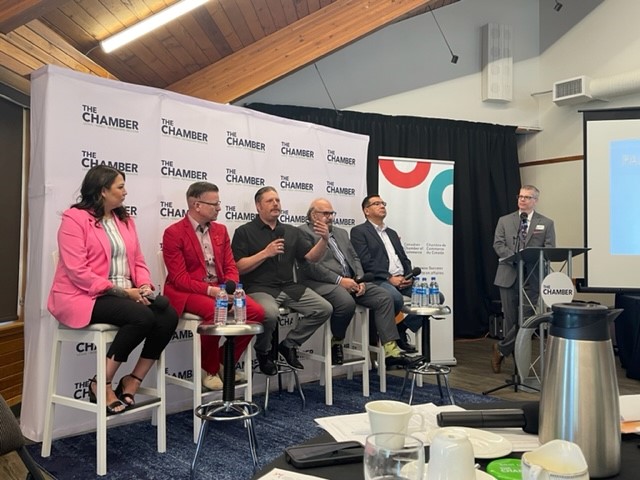Blog /
What We Heard: “Economic Reconciliation and Indigenous Entrepreneurship” Inclusive Growth Dialogue
What We Heard: “Economic Reconciliation and Indigenous Entrepreneurship” Inclusive Growth Dialogue
In May 2023, we hosted an Inclusive Growth Dialogue on the topic of “economic reconciliation and Indigenous entrepreneurship.”

In May 2023, in partnership with the Leduc, Nisku and Wetaskiwin Regional Chamber of Commerce, we hosted an Inclusive Growth Dialogue on the topic of “economic reconciliation and Indigenous entrepreneurship” in Nisku, Alberta. The Inclusive Growth Dialogue opened with a lively panel discussion, featuring:
- Danielle Baptiste, Owner, Sage Beauty
- Darryl Addison, General Manager, SATO Canada
- Justin Bourque, President, Athabasca Indigenous Investments
- Reg Potts, Director, Partnerships and Indigenous Development, Backwoods Energy Services
- Wayne Di Lallo, Co-owner, DFW Career Services
After the panel, attendees heard from keynote speaker, Derek M. Bruno, Founder, SevGen Consulting, before breaking intro roundtable discussion groups to further explore what they had heard.


Here are some of the highlights from this important dialogue:
Economic Reconciliation
In the process of economic reconciliation, it is important to recognize the long-term effects of intergenerational trauma (such as the trauma endured in residential schools) on Indigenous communities and acknowledge its significance.
Economic reconciliation requires:
- Acknowledging existing challenges faced by Indigenous communities.
- Including Indigenous communities in economic activities.
- Recognizing treaty and aboriginal rights.
- Reframing economic systems to align with Indigenous cultural frameworks.
- Building partnerships between organizations and Indigenous communities for long-term benefits.
- Supporting Indigenous communities in terms of training and employment opportunities.
- Educating the public about Indigenous cultures, histories, and issues.
- Developing the northern regions of Canada.
- Investing in teachers, elder care programs, critical infrastructure, and community development.
Barriers Experienced by Indigenous Individuals and Entrepreneurs
Current laws, programs and policies fail to adequately address the specific barriers faced by Indigenous populations and even create additional obstacles that impede the building of sustainable economies and the accumulation of wealth.
A significant barrier faced by Indigenous people is the racism and discrimination that hinders their access to opportunities for advancement in various aspects of life, including education, employment, mentorship and financial services.
- Indigenous individuals often find themselves confined to minimum wage jobs, with limited chance of advancement or recognition of their potential.
- Indigenous entrepreneurs struggle to access capital as well as find mentors, quality education and training opportunities.
- Indigenous businesses regularly encounter difficulties in securing loans or financial assistance from banks and other institutions.
Employer Responsibility in Promoting Reconciliation
Employers can promote reconciliation by establishing culturally safe workplaces that recognize and accommodate the diverse and unique needs and backgrounds of Indigenous employees from various nations, reserves and communities. A culturally safe workplace must include employers actively addressing and eliminating abusive, discriminatory, and stereotyping behaviours. Employers can also help Indigenous employees get recognition, training and professional growth by creating opportunities for mentorship, modifying training programs to facilitate the hiring and inclusion of Indigenous individuals, and encouraging the development of ideas and initiatives that promote workplace collaboration.
The Role of Chambers of Commerce in Economic Reconciliation
There are many positive actions chambers of commerce can take in forwarding economic reconciliation and fostering long-term relationships with Indigenous businesses and communities, including:
- Participating in community events and promoting Indigenous-based events that reverse stereotypes.
- Hosting training, education and coaching opportunities and workshops.
- Highlighting the success stories of Indigenous communities’ leaders and sharing.
- Advocating for reducing barriers in accessing grants and funding for Indigenous entrepreneurs and businesses.
- Establishing partnerships with Friendship Centres and collaborating with Indigenous communities to create mastermind groups, share information, and build bridges of support.
It is critical that chambers adopt the reconciliation practices they promote by hiring Indigenous employees, increasing the representation of Indigenous groups on boards of directors and providing training and coaching for and about Indigenous communities and representation.
The Canadian Chamber of Commerce’s Commitment to Reconciliation
In the spirit of reconciliation, the Canadian Chamber of Commerce is committed to building respectful relationships that support Indigenous rights and improve business opportunities for Indigenous peoples. For a number of years, we have had the Canadian Chamber’s Indigenous Affairs Policy Committee, mandated to examine practices that reinforce relationships between Indigenous and non-Indigenous businesses and communities. The Committee advocates for legislation, regulation, and policy which support opportunities that grow Canada’s economy, respect the rights of Indigenous people, advance economic reconciliation and align with the United Nations Declaration on the Rights of Indigenous People.
About the Inclusive Growth Dialogues
In collaboration with the Canadian Chamber Network, we co-hosted five Inclusive Growth Dialogues in 2023. These dialogues provide an opportunity to identify challenges and opportunities relating to the role chambers can play in advancing economic reconciliation and fostering a more inclusive business community.
The What We Heard blogs for Halifax’s Inclusive Growth Dialogue on celebrating Nova Scotia’s Black economy, and Guelph and Coquitlam’s Inclusive Growth Dialogues on employment inclusion of people with visible and invisible disabilities are ready to read!
Related News

Time to put reports into action, Chamber tells House Agriculture Committee

2022 Q3 Canadian Survey on Business Conditions: Inflation is the top issue. Labour pains intensifying, but price pressures and supply chains issues are improving




